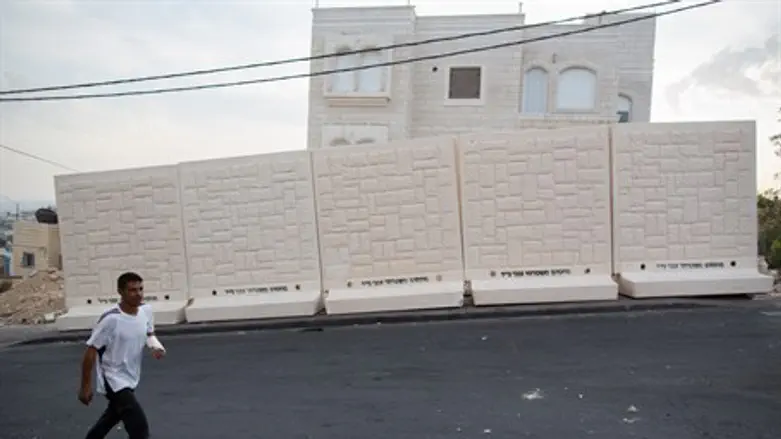
Prime Minister Binyamin Netanyahu's decision to post temporary concrete walls at the southeastern Jerusalem neighborhood of Armon Hanatziv - so as to block Arab terrorists from the adjacent Jabel Mukaber - came under fire Sunday night at a Security Cabinet meeting.
In response to the public outcry over the move, which is viewed by many as a de facto division of the capital between Jewish and Arab majority neighborhoods, Netanyahu on Monday morning ordered not to build more walls at friction points in Jerusalem.
Arutz Sheva has learned that the deployment of concrete walls was in fact the initiative of Jerusalem Mayor Nir Barkat, in a decision made together with security sources, and Cabinet ministers claimed they were caught unaware of the move.
However, it appears that the security barrier is in fact an old decision of the Cabinet which was authorized as a pilot program a month ago.
The Cabinet meeting on Sunday night was supposed to deal with means of countering Palestinian Arab incitement, but a considerable portion of it was dedicated instead to fierce criticism against the placement of the concrete barriers, which began just before the meeting.
Transportation Minister Yisrael Katz (Likud) said "the wall placed opposite homes in Armon Hanatziv divides Jerusalem and is perceived as an accomplishment and a prize to terror."
"It also won't bring security, and it must be removed immediately," urged the minister.
"We must defend the homes of Armon Hanatziv with aggressive actions full of initiative against the terror infrastructures and the incitement in Jabel Mukaber, and not by building walls and fortifying in Armon Hanatziv - this is a dangerous precedent. The Cabinet never decided on placing walls in the heart of Jerusalem," claimed the minister.
"Better they suffer than that we flee"
Immigrant Absorption Minister Ze'ev Elkin (Likud) and Education Minister Naftali Bennett (Jewish Home) backed Katz's position, and Defense Minister Moshe Ya'alon (Likud) also expressed doubts about the process and that way it is liable to be perceived.
Katz demanded that Netanyahu order Internal Security Minister Gilad Erdan (Likud) to find alternate operational solutions to stem the tide of terror into Armon Hanatziv, such as posting security forces and snipers on the roofs of homes in Jabel Mukaber so as to crack down on rock and firebomb attacks against Jewish motorists.
"It is better that they suffer than that we flee," said Katz.
Diplomatic sources note that the wall is a security issue only, intended to deal with particular sensitive points so as to increase the capital's security. One Likud minister claimed that the process has no diplomatic meaning and should not be interpreted as having any.
Regardless of those claims, many have warned that the capital is being divided in the move, which comes on the heels of a de facto divide by which Jews are blocked from entering Arab majority neighborhoods that to a large measure operate in the absence of Israeli sovereignty.
Armon Hanatziv has been a frequent target of terror, with the most major attack coming last Tuesday when two Arabs tried to hijack a bus and went on a stabbing and shooting rampage that left two people murdered and nearly 20 wounded.